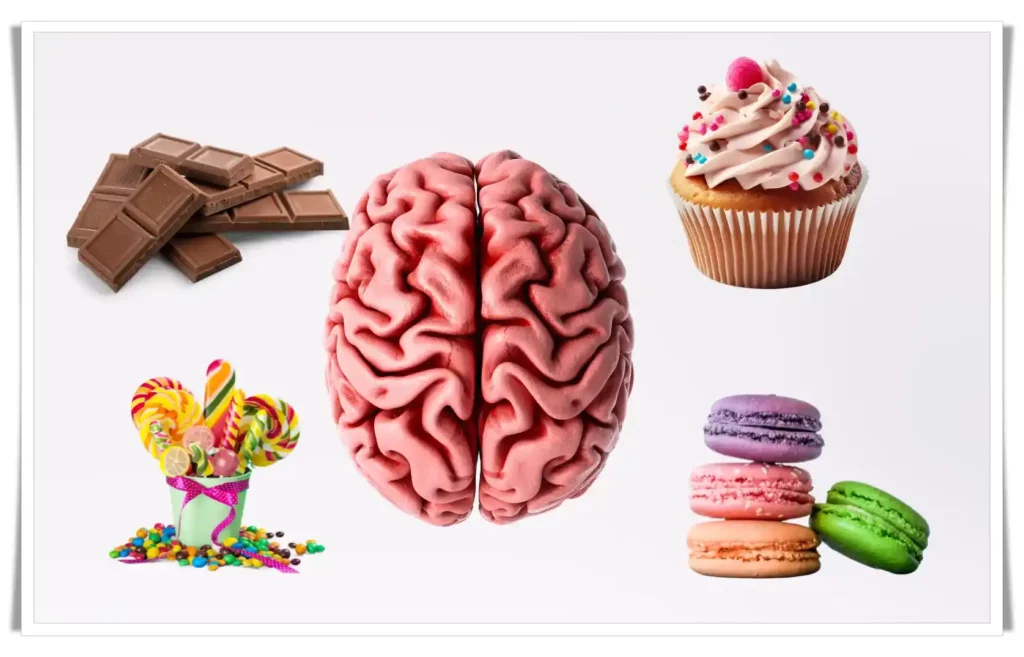Craving for sweets is a common struggle that many people face daily. Whether it's reaching for a cookie after a meal or indulging in a chocolate bar during a stressful day, the desire for something sweet can feel overwhelming. Understanding why we crave sweets and, more importantly, how to control these cravings is essential for maintaining a healthy lifestyle. In this comprehensive guide, we'll explore the science behind sugar cravings, the impact of sugar on the brain, and provide actionable strategies to help you regain control.
"Craving for Sweets is often caused by imbalances in blood glucose levels. Low blood sugar levels might cause you to crave something sweet in order to bring up these levels. Other factors that can play a role include psychological stress, medications, hormone imbalances, and health conditions." -VeryWell Mind
The problem is that when we taste something sweet, our brain is flooded with dopamine. Dopamine is the "happiness hormone," a substance we can never get enough of. It’s released when we’re on social media platforms, playing video games, falling in love, or when we’re motivated to do something.
The Science Behind of Craving for Sweets
How Sugar Affects the Brain

When you consume sugar, your brain's reward system is activated, releasing dopamine, a neurotransmitter that makes you feel good. This reaction is similar to the one triggered by addictive substances such as drugs. As a result, the more sugar you consume, the more you crave it, creating a vicious cycle that can be challenging to break.
The Association Between Negative Feelings and Reward – Or How We Eat Our Emotions
Dr. Judson Brewer, a psychiatrist with expertise in neuroscience who has studied addiction, explains how our survival instinct teaches us to embrace and seek out sweet tastes.
Judson says that when we see something enticing, like a chocolate cake, our brain associates it with calories = survival. We taste it, like it, and eat it. And when it comes to sugar, our body sends a signal to the brain to remember what we’ve consumed so that we can find the same food again in the future.
If, as a child, you were given sweets whenever you were upset or treated to a cake at the end of a hard day, as an adult, these associations can lead to what’s known as emotional eating.
This can result in turning to food whenever you’re upset, in an attempt to feel better. This is how emotional eating develops, based not on hunger but on a feeling of insufficiency.
The Role of Evolution in Sweet Cravings
From an evolutionary perspective, our ancestors were programmed to seek out high-calorie foods for survival. Sweet foods, often found in ripe fruits, signaled a good source of energy. This innate preference for sweetness has carried over into modern times, where the availability of sugar-laden foods is no longer a rarity but a constant temptation.
The Impact of Modern Diets on Sugar Consumption
Unlike our ancestors, who consumed natural sugars from fruits, today's diets are overloaded with added sugars found in processed foods. This excessive consumption has been linked to various health issues, including obesity, type 2 diabetes, and heart disease. Understanding how modern diets contribute to sugar cravings is crucial for developing effective strategies to manage them.
Why We Crave Sweets
The Biological Basis of Sugar Cravings
Sugar cravings can be traced back to the brain's reward system, where dopamine plays a key role. When you eat sugar, your brain releases dopamine, creating a pleasurable sensation that encourages you to repeat the behavior. Over time, your brain begins to associate certain cues, like the smell of baked goods or the sight of a candy bar, with the release of dopamine, leading to cravings.
Emotional Eating and Sugar Cravings
Emotional eating is another significant factor contributing to sugar cravings. When you're stressed, anxious, or sad, your brain seeks comfort, often in the form of sugary foods. This behavior can create a cycle where you eat sweets to feel better, only to experience a crash later, leading to more cravings.

Social and Cultural Influences on Sugar Consumption
Social and cultural factors also play a role in sugar cravings. Celebrations, holidays, and social gatherings often revolve around sweet treats, making it difficult to avoid sugar. Additionally, marketing and advertising bombard us with images of sugary foods, reinforcing the idea that consuming them is normal and desirable.
How to Control Sweet Cravings
Effective Strategies to Manage and Reduce Cravings
Controlling sugar cravings requires a combination of awareness, behavior modification, and strategic planning. Here are some proven methods to help you regain control over your sweet tooth:
Identify Triggers and Break Associations
One of the first steps in controlling sugar cravings is identifying the triggers that lead to them. These triggers could be emotional (e.g., stress, boredom), environmental (e.g., having sweets at home), or social (e.g., celebrations). Once you've identified your triggers, work on breaking the associations between these triggers and consuming sweets.
Practical Tips to Break Associations
- Change Your Routine: If you usually reach for sweets at a certain time of day, try altering your routine. For example, take a walk during your typical snack time.
- Remove Temptations: Keep sugary snacks out of your home and workspace. The less accessible they are, the less likely you'll be to indulge.
- Substitute with Healthier Options: Replace sugary snacks with healthier alternatives like fruits, nuts, or yogurt. Over time, your taste buds can adapt to enjoying less sweet foods.
Manage Stress to Reduce Emotional Eating
Stress is a major contributor to sugar cravings, as it can trigger emotional eating. Managing stress through relaxation techniques, exercise, and mindfulness can help reduce the urge to reach for sugary comfort foods.
Stress Management Techniques
- Practice Mindfulness: Mindfulness meditation can help you become more aware of your cravings and the emotions behind them, allowing you to make more conscious choices.
- Engage in Physical Activity: Exercise is a natural stress reliever that can reduce your desire for sugary foods. Even a short walk can help clear your mind and curb cravings.
- Develop Healthy Coping Mechanisms: Instead of turning to sweets when stressed, find other activities that bring you comfort and joy, such as reading, journaling, or talking to a friend.
Balanced Nutrition to Prevent Cravings
A well-balanced diet is crucial in preventing sugar cravings. When your body receives the right nutrients, you're less likely to experience the highs and lows that lead to cravings.

Nutritional Strategies
- Prioritize Protein and Fiber: Protein and fiber-rich foods can help stabilize blood sugar levels and keep you feeling full longer, reducing the likelihood of sugar cravings.
- Stay Hydrated: Sometimes, what you perceive as a sugar craving is actually thirst. Make sure you're drinking enough water throughout the day.
- Eat Regular Meals: Skipping meals can lead to blood sugar dips, which often trigger cravings. Aim for balanced meals and snacks throughout the day to keep your energy levels steady.
The Impact of Sleep on Sugar Cravings
How Sleep Deprivation Increases Cravings
Lack of sleep has been shown to increase cravings for high-calorie, sugary foods. When you're sleep-deprived, your body produces more ghrelin, the hormone that signals hunger, and less leptin, the hormone that signals fullness. This hormonal imbalance can lead to increased appetite and cravings for sweets.
Tips for Better Sleep
- Establish a Sleep Routine: Go to bed and wake up at the same time every day to regulate your body's internal clock.
- Create a Relaxing Bedtime Ritual: Engage in calming activities before bed, such as reading or taking a warm bath, to help your body wind down.
- Limit Caffeine and Sugar Before Bed: Consuming caffeine or sugar too close to bedtime can interfere with your ability to fall asleep and stay asleep.
The Role of Exercise in Managing Cravings
How Physical Activity Helps Control Cravings
Regular physical activity is an effective way to manage sugar cravings. Exercise releases endorphins, which can improve your mood and reduce the desire for sugary foods. Additionally, it helps regulate blood sugar levels and improve overall energy, making it easier to resist cravings.
Exercise Strategies for Craving Control
- Incorporate Regular Exercise: Aim for at least 30 minutes of moderate exercise most days of the week. This could be anything from walking to cycling to strength training.
- Use Exercise as a Distraction: When a craving strikes, try going for a quick jog or doing a set of jumping jacks. Physical activity can help distract you from the craving and reduce its intensity.
- Practice Mindful Movement: Activities like yoga and tai chi combine physical movement with mindfulness, helping you stay present and aware of your cravings.

FAQs About Sugar Cravings
What Causes Sudden Cravings for Sweets?
Sudden cravings for sweets can be caused by several factors, including blood sugar dips, stress, lack of sleep, and hormonal fluctuations. Identifying and addressing the underlying cause can help reduce the frequency and intensity of these cravings.
Can Sugar Cravings Indicate a Nutrient Deficiency?
In some cases, sugar cravings may indicate a deficiency in certain nutrients, such as magnesium, chromium, or B vitamins. Ensuring that your diet is well-balanced and includes a variety of nutrient-dense foods can help reduce cravings.
How Can I Train My Taste Buds to Crave Less Sugar?
You can train your taste buds to crave less sugar by gradually reducing your intake of sugary foods and replacing them with healthier options. Over time, your taste buds will adjust, and you may find that you no longer crave sugar as intensely.
Is It Okay to Indulge in Sweets Occasionally?
It's perfectly okay to indulge in sweets occasionally, as long as it's done in moderation. The key is to enjoy these treats mindfully and without guilt, ensuring that they don't become a regular part of your diet.
Are Artificial Sweeteners a Good Alternative to Sugar?
Artificial sweeteners can be a good alternative to sugar for those looking to reduce their sugar intake. However, they should be used in moderation, as some studies suggest that they may still trigger sugar cravings in some individuals.
Common Triggers for Sugar Cravings and How to Address Them
| Trigger | Description | Strategy to Address |
|---|---|---|
| Stress | Emotional stress leading to comfort eating | Practice mindfulness, exercise |
| Boredom | Eating out of boredom rather than hunger | Engage in a hobby or physical activity |
| Social Events | Celebrations and gatherings with high-sugar foods | Eat a healthy meal before attending |
| Environmental Cues | Keeping sweets within easy reach | Remove or replace with healthier snacks |
| Hormonal Changes | Fluctuations in hormones, particularly in women during menstrual cycles | Maintain balanced nutrition, regular exercise |
Case Study: The Association Between Sugar Intake and Emotional Well-being
In a study titled The Effects of Sugar on Mood: A Double-Blind, Randomized Controlled Trial, researchers explored the impact of sugar consumption on emotional well-being. The study involved 250 participants who were divided into two groups. One group consumed a sugar-laden beverage, while the other consumed a placebo beverage with no sugar. The participants' mood and energy levels were assessed before and after consumption.

The results showed that the group consuming sugar experienced a significant mood boost shortly after consumption. However, this was followed by a sharp decline in mood and energy, often referred to as the "sugar crash." The placebo group, on the other hand, maintained a stable mood and energy level throughout the study.
This study highlights the short-term benefits and long-term drawbacks of sugar consumption on mood. While sugar may provide an immediate sense of pleasure and energy, the subsequent crash can leave you feeling worse than before. Understanding this cycle can help individuals make more informed decisions about their sugar intake, particularly when it comes to emotional eating.
Conclusion: Taking Control of Your Sweet Cravings
Sugar cravings are a common challenge, but they don't have to control you. By understanding the science behind these cravings and implementing strategies to manage them, you can reduce your reliance on sugary foods and improve your overall health. Remember, it's not about completely eliminating sugar from your diet, but rather finding a balance that allows you to enjoy sweets in moderation.
If you found this article helpful, you might also enjoy reading The Sweet Sabotage: How Various Sugars in Ultra-Processed Foods Impact Your Health and watching the YouTube video Sugar's Surprising Effect on Your Body's Immune Response.
Please leave a comment below with your thoughts or questions, and I'll be sure to respond as soon as possible. Your feedback is valuable and helps me create content that is both informative and engaging.
Trustworthy resources:
Harvard Health Publishing - The Sweet Danger of Sugar
Mayo Clinic - Nutrition and Healthy Eating
American Heart Association - Sugar 101
Centers for Disease Control and Prevention (CDC) - Added Sugars
National Institute on Drug Abuse - Sugar and the Brain
The Craving for Sweets – Why it Occurs and How to Control it.




